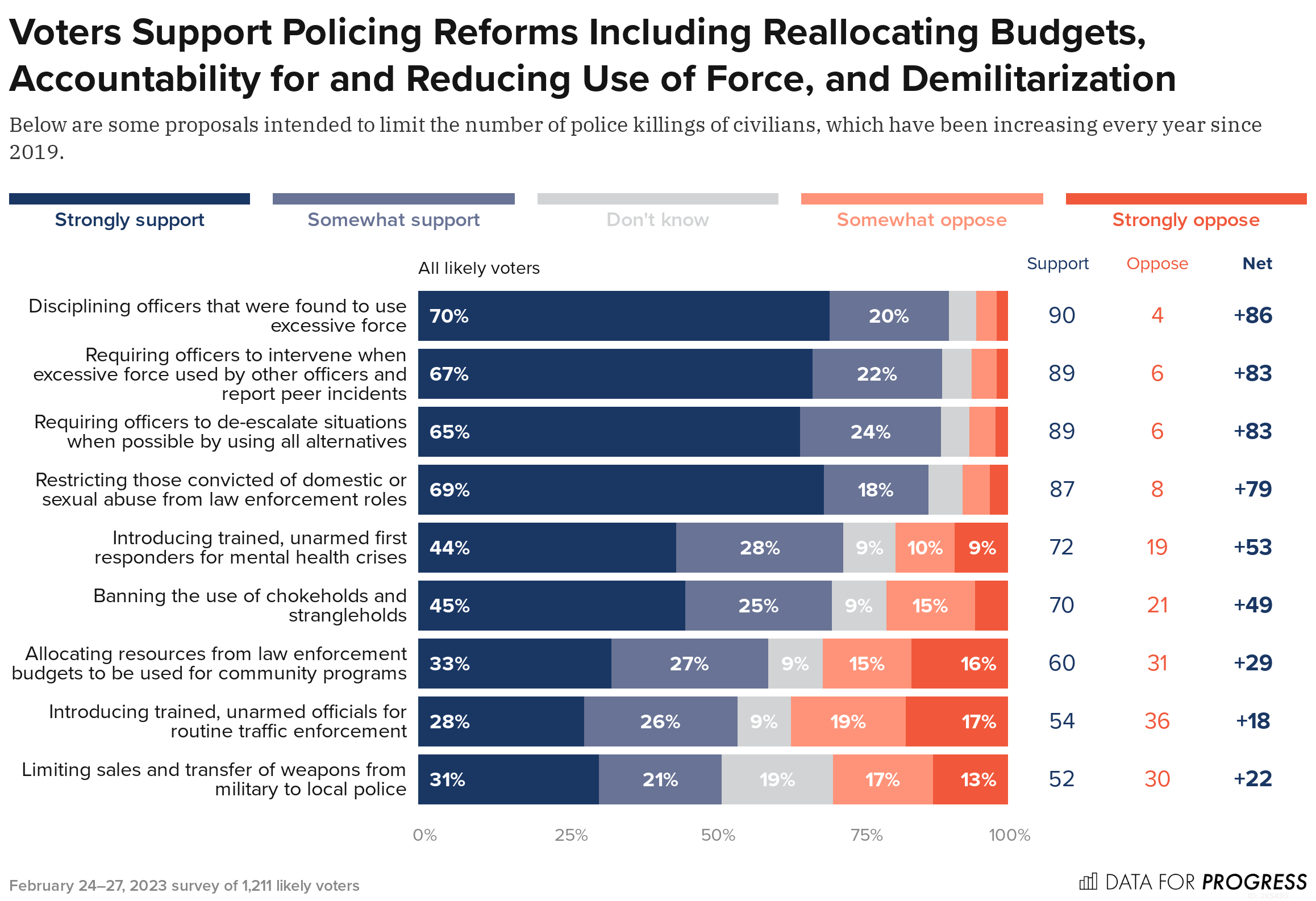Majorities of Voters Support Criminal Charges for Those Involved in Tyre Nichols’ Killing and a Range of Policing Reforms
By Natasha Chisholm and Anika Dandekar
On January 7, 2023, 29-year-old Tyre Nichols was pulled over by police for allegedly driving recklessly. He was beaten for roughly three minutes, and after three days succumbed to his injuries. Five officers involved face criminal charges, including second-degree murder, aggravated assault, and aggravated kidnapping. Two responding EMTs did not provide medical assistance to Nichols for 19 minutes upon arriving at the scene, and their licenses were subsequently suspended. More police officers and fire department personnel are being investigated by their departments for their involvement in Nichols’ death.
This tragedy is not an isolated one; despite public outcry following the killings of George Floyd and Breonna Taylor, police killings of civilians in America have been increasing yearly since 2020, with 2022 being the deadliest year on record. A new survey conducted by Data for Progress finds that nearly 90 percent of voters across party lines support the decision to criminally charge the police officers responsible for Nichols’ death. It also finds that majorities of voters support a variety of police reforms, from de-escalation to demilitarization.
Voters’ Attitudes on the Tyre Nichols Case
An overwhelming majority of voters (88 percent) support the decision to criminally charge the police officers involved in the killing of Nichols, including 94 percent of Democrats, 88 percent of Independents, and 83 percent of Republicans. There is strong support to charge the officers among Black (94 percent), white (89 percent) and Latino/a respondents (82 percent).
Interestingly, 85 percent support taking disciplinary action against all public services personnel who contribute to police killings, as in the case of Nichols, including 92 percent of Democrats, 83 percent of Independents, and 78 percent of Republicans. This support holds strong across race as well: 92 percent of Black voters, 85 percent of white voters, and 84 percent of Latino/a voters.
Voters Support Wide Range of Police Reforms
Eighty-nine percent of voters, including majorities of voters of all parties, support two reforms that could have saved Nichols’ life and many others. The first would require officers to de-escalate situations when possible by communicating with subjects, maintaining distance, and using all alternatives before using deadly force. The second reform would require officers to intervene in the use of excessive force by other officers, and report peer incidents immediately. Also pertinent to the Nichols case is a new finding here showing that 54 percent of voters back introducing trained, unarmed officials for routine traffic enforcement — a +18-point margin of support.
Data for Progress polled support for other policing reforms that could reduce killings of civilians. We find that voters support:
Restricting those convicted of domestic or sexual abuse from law enforcement roles, by a +79-point margin
Introducing trained, unarmed first responders for mental health crises, by a +53-point margin
Banning chokeholds and strangleholds, by a +49-point margin
Allocating resources from law enforcement budgets to be used for community programs like mental health treatment and food security, by a +29-point margin
Limiting sales and transfers of weapons from military to local police, by a +22-point margin
This aligns with a previous Data for Progress poll showing that over two-thirds of voters support the George Floyd Justice in Policing Act, which would mandate body cameras, ban chokeholds, create transparency for use of force, hold acts of racial profiling accountable, and end qualified immunity.
Conclusion
There was gross misconduct by officials involved in the killing of Tyre Nichols — from the police officers who used brutal force and inflicted harm to the EMTs who stood around and watched him cry out. Police have historically been used as tools of oppression against Black communities; this incident is yet another painful reminder of the systemic racism and violence against Black people that have been perpetuated by law enforcement in America since the nation’s founding. The fact that Black individuals are three times more likely to be killed by law enforcement than white individuals — paired with increasing numbers of civilians brutalized at the hands of police, even in the face of widespread public outcry against it — proves the legacy of white supremacy remains deep-seated.
The broad popularity of legislative and administrative action, with 9 in 10 voters supportive of common-sense requirements such as de-escalation, intervening in peer use of excessive force, and disciplining those involved in misconduct, is a testament to the urgent need for change. Beyond that, though, voters, in backing proposals that would demilitarize police, bar abusers from law enforcement, and reallocate police budgets to community investments, seem to recognize the obligation to go beyond the individual officer level and address structural issues. Only when we recognize and deal with these fundamental problems will justice truly be served for Tyre Nichols and countless other victims of police brutality.
Natasha Chisholm is a political intern at Data for Progress.
Anika Dandekar (@anikadandekar) is a senior analyst at Data for Progress.



